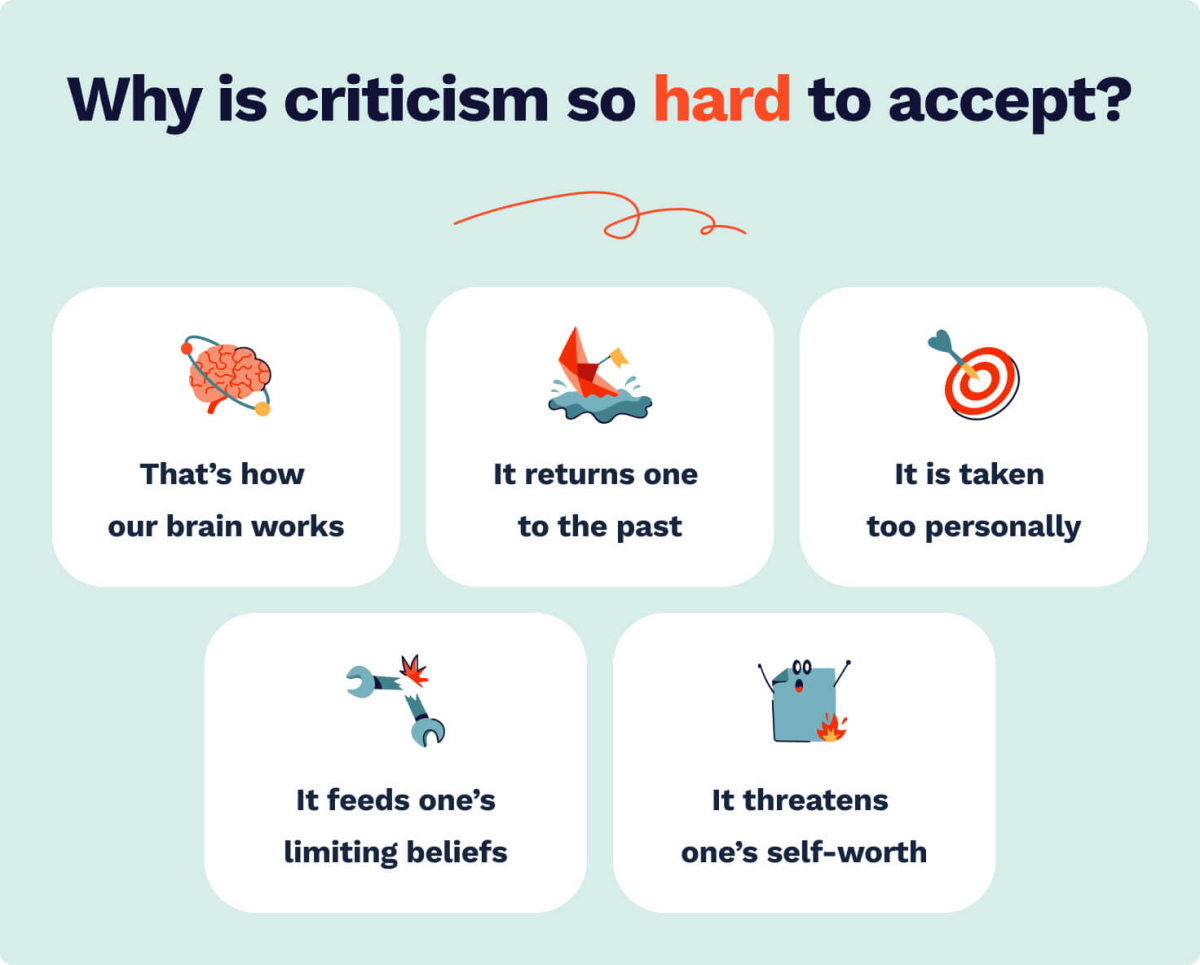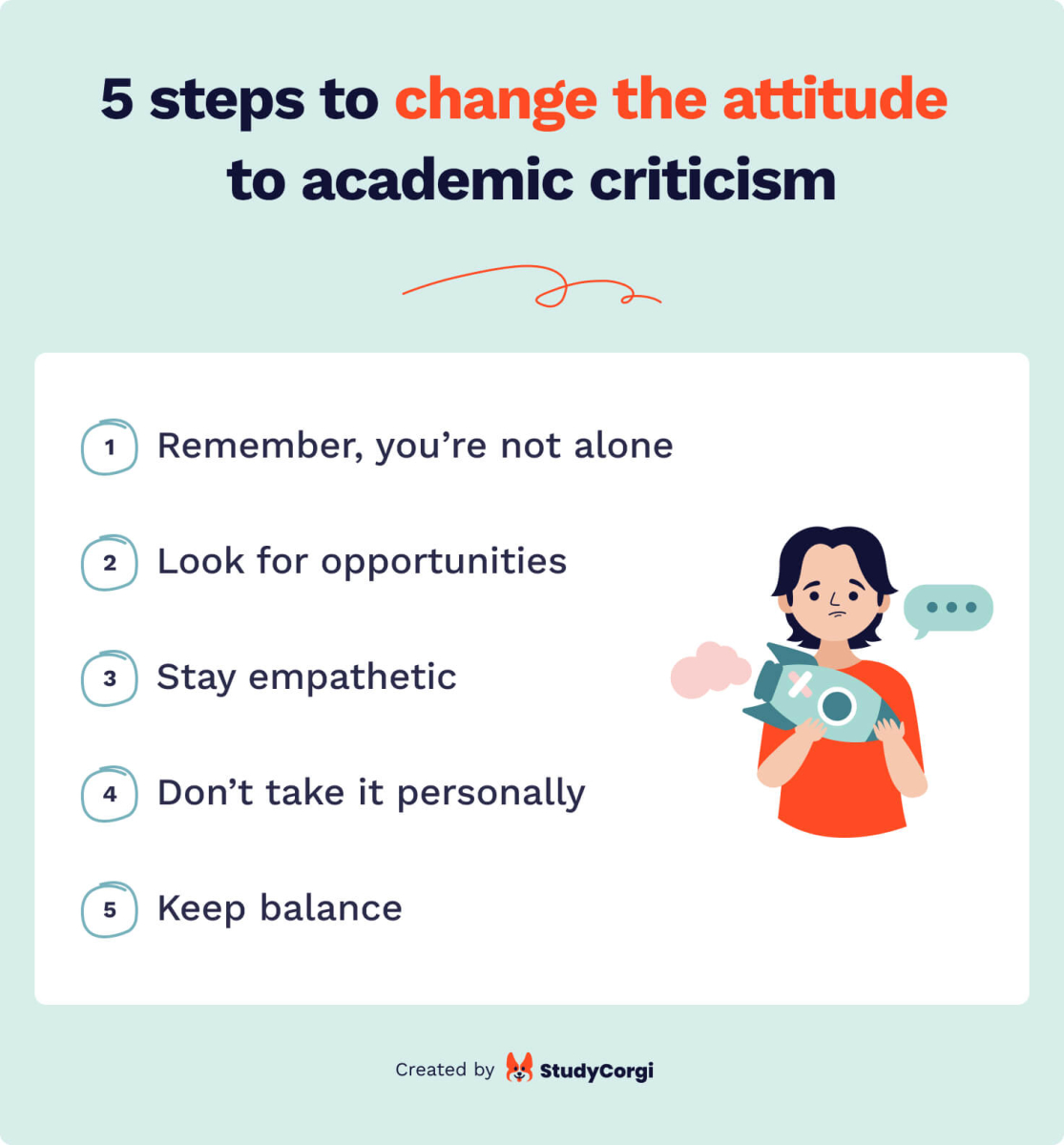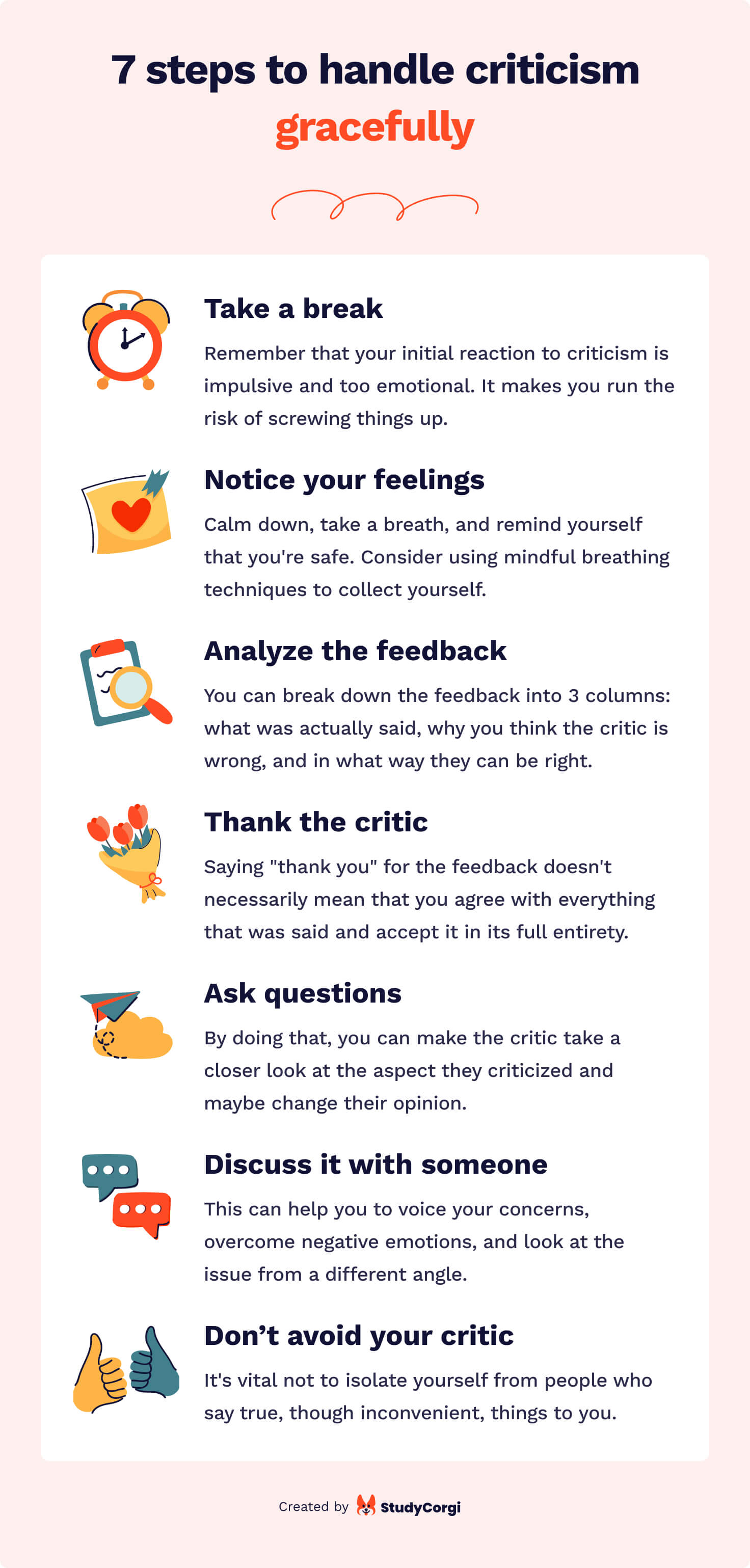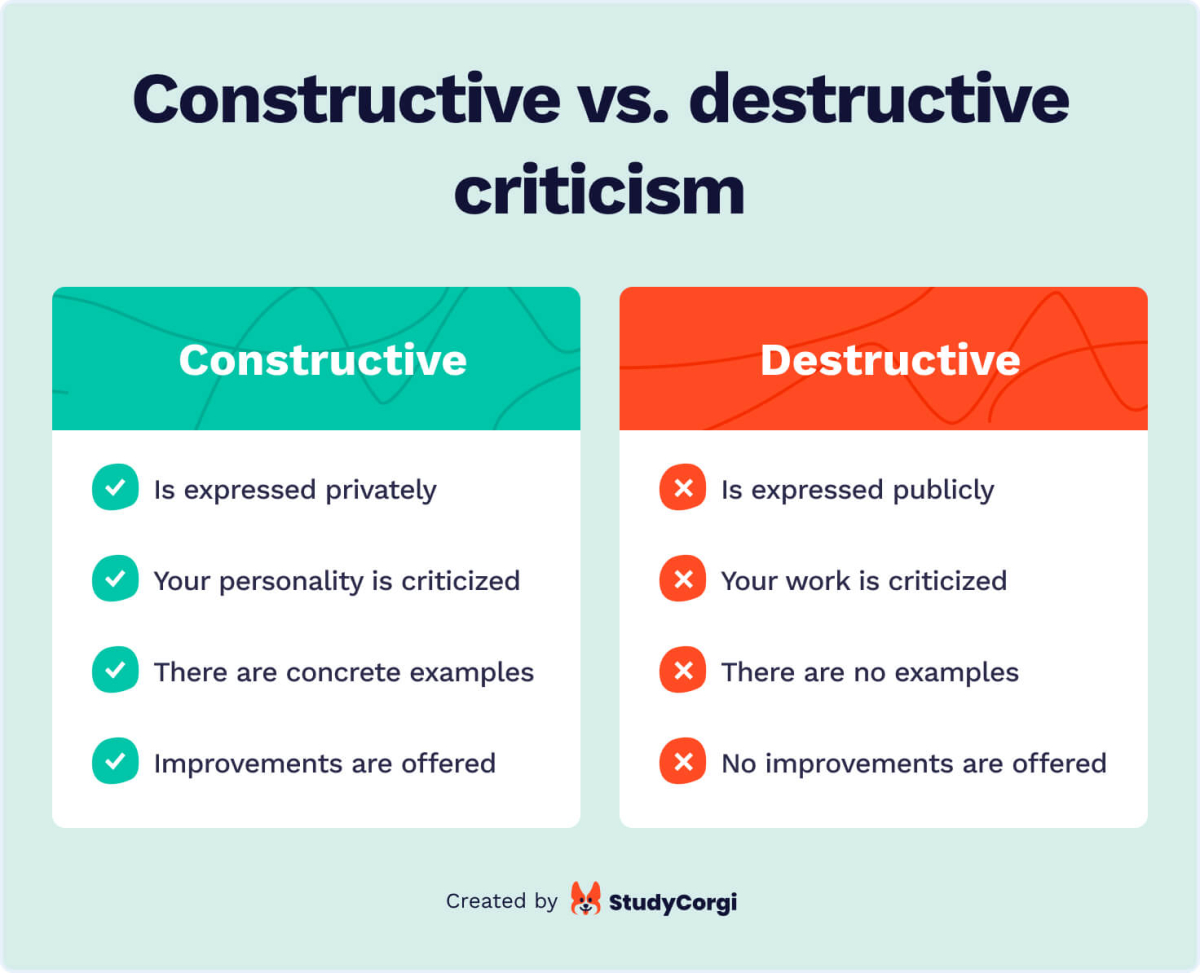What is your first response when you receive negative feedback from your professor? Do you feel that their comments insult your intelligence or belittle your worth?
We have good news.
If their opinion makes you feel like your work is not valuable, you aren’t alone.
We’ve developed this guide to help you grow a thick skin when your teacher has a critical response to your work. Learning this skill will enable you to develop an objective, positive, and progressive response to negative feedback. You will also benefit from actionable tips to help you take feedback seriously without letting it get too personal. Keep reading to learn more.
⚔️ Criticism Is Inevitable
Presenting your argument doesn’t necessarily mean your teachers will agree with it. Instead, they might give their counterarguments to show why your position is flawed or limited.

But what is a scientific argument?
A sound scientific argument involves disagreeing about scientific claims or explanations, always using empirical data to defend each side of the debate.
Using scientific arguments requires you to support your claims for or against a particular position with evidence gathered via observation or experimentation.
You are expected to:
But does this mean that people who give negative feedback always do it correctly?
Definitely not.
Your professors may go to extremes when critiquing your work, even if they mean well. Alternatively, a critic may do their job well, but the receiver might not accept the critical reviews as intended.
Therefore, the best piece of advice is to receive every piece of criticism positively so that it doesn’t erode your self-worth and so that you have the confidence to try again.
Don’t allow negative reviews to sink into your mind, or they might cause conditions like depression.
Yes, criticism is inevitable, and you can’t control your critics, but you can regulate your response to them.
📩️ Feedback in Educational Process
Every college student experiences academic criticism in multiple forms.
It can come in response to:
- Routine classwork assignments
- Class discussions
- Grant proposals
- Term papers
- Serious educational projects like a Master’s thesis or Ph.D. dissertation
You should be prepared to face this reality throughout your academic journey.
You will inevitably receive criticism along the way when you make mistakes or miss a few points here and there.
Additionally, you may receive negative feedback on academic projects outside your classwork. For instance, if you might want to publish your article in a scientific journal, then that publication will have to undergo a mandatory double-blind peer review.

In a double-blind peer review setting, you submit your work to unnamed peers who comment on it anonymously. On the one hand, this anonymity gives the critic an objective view of your work. After all, if they don’t know you, they can’t have a bias.
The advantages and drawbacks of double-blind peer review include the following:
😰 Why Is Criticism So Hard to Accept?
Feedback is necessary and inevitable in a student’s life. However, accepting it maturely can be challenging for many reasons.
For instance, some students have difficulties differentiating their self-worth from their academic work.

Negative criticism affects their confidence. Below are some of the main reasons students may find it challenging to accept criticism.
That’s How the Human Brain Works
Human beings naturally see more negatives in others than positives.
For instance, a person can easily criticize someone else for something they got wrong but forget to praise them for the many things they did correctly.
This tendency explains why our mental conditioning focuses more on negative feedback than positive. Even when commended for doing things correctly, people don’t stay with that praise as long as they do with negative comments.
Some psychologists argue that the human mind has a “negativity bias” that focuses on negatives more than positives. To combat this tendency, you can retrain your mind to focus on positive feedback rather than critical comments. This approach is the best way to remain happy and upbeat despite critical reviews of your actions and efforts.
Criticism Returns One to the Past
Highly sensitive people have difficulty responding to negative experiences because they remind them of past criticism, reactivating their emotional pain. They can’t shake it off and move forward without suffering some level of emotional breakdown, even a mild one. Their reaction to criticism is deeply rooted in their “emotional brain” that bypasses their “thinking brain” or reason. This part of the brain contains a databank that stores emotional memories, so it’s no surprise that it triggers those sensations.
These people usually feel they aren’t “good enough” when criticized. Unfortunately, this feeling makes them struggle to please everyone in order to avoid criticism—an impossible mission.
The problem is that no one can please everyone, even when you do everything right. Haters are there to criticize and frown on your success, and you can’t stop them.
Thus, trying to win everyone’s approval is like trying to empty a lake with a bucket.
Criticism Is Taken Too Personally
As we mentioned before, some people can’t differentiate between a person and their efforts. Some mix these two realities, connecting every mistake they make to who they are. Such responses make people take everything too personally. They usually feel that when someone gives critical feedback about their article or book, that person is against them.
As a student aiming to climb the academic ladder, be ready to know that you aren’t your efforts or achievements. If someone points out mistakes in your work, it doesn’t mean that you yourself are a mistake.
So, how do you avoid the trap of taking everything personally? Here are a few suggestions worth considering.
- Optimize negative feedback to learn from your mistakes and grow.
- Receive criticism to remind yourself that you don’t have a complete picture.
- Choose to hear negative feedback differently and look at the bigger picture.
- Contact the reviewer for further assistance or an explanation if possible.
Criticism Feeds One’s Limiting Beliefs
Criticizing or blaming your critics distracts your focus from the person who should be improving – you!
Remember, the criticism your critic gives you is meant to help you change for the better.
Therefore, shifting the focus to the source of feedback won’t change the situation or circumstances that caused that negative feedback. Blaming well-meaning critics only feeds negative self-beliefs that might have caused the negative comments. It pampers the limiting beliefs that hinder your development from outgrowing your current negative feedback.
Further, those limiting beliefs shut the door to your growth and improvement. They blind you to how other people perceive you and your actions. The result? You only see things from the myopic view you are accustomed to without exploring the bigger picture that exists outside you.
Criticism Threatens One’s Self-Worth
As seen earlier, some students have problems separating themselves from their achievements. These people have problems accepting negative criticism.
They feel:
- Shocked
- Stunned
- Embarrassed
- Hurt
- Sad
- Ashamed
Some even report feelings of worthlessness and numbness. Others feel angry, betrayed, and violated.
These people usually have a high expectation of approval from their surrounding seniors and peers. When others disapprove of them, they begin to experience all the negative feelings described in the previous paragraph.
So, why does negative feedback produce these emotions? Because it cuts across people’s fundamental psychological needs: safety and personal worth.
However, research shows that these reactions mostly result from our defensive, combative, and resentful responses to feedback and critics. Thus, there’s nothing inherently “threatening” in the feedback or criticism. The ball is in the receiver’s court to develop a thick skin to hear criticism and outgrow the circumstances that provoked it.
🔀 5 Steps to Change Your Attitude to Academic Criticism
We have seen that the biggest problem behind the negative response to academic criticism isn’t because of the negative feedback or the professors giving it. The problem lies within the students who respond incorrectly to it. It’s wise to make the most out of negative feedback and transform it into your advantage.

Below are five steps to help you.
Remember, You Are Not Alone
Receiving critical comments with little or impaired self-confidence can make you feel lonely. You may start assuming you are the “only” one receiving such feedback. However, the fact is that you are among millions of other students undergoing this academic process.
So, you should start seeing yourself in the company of many other students with caring supervisors and coaches who can point out your shortcomings and help you overcome them.
Otherwise, you can slide into loneliness, which can degenerate into depression – a severe mental disorder. Avoid this decline by sharing your negative feedback with your classmates to create a fellowship that can help you improve.
Look for Opportunities, not Threats
A person’s negative reaction to criticism doesn’t necessarily mean someone or something is threatening them. Mostly, their deep-seated insecurities make them feel threatened. These feelings can make that person assume they’re under attack when the critic is only trying to help them.
If you experience such feelings, it may be beneficial to think of negative feedback as the negative side of an electric wire. It takes negative and positive polarities to generate power.
Likewise, it takes negative feedback to balance the positive comments you receive to remain on track, knowing that you haven’t arrived at perfection yet.
This perspective should help you balance your “performance equation” by seeking better growth opportunities.
Below are some of the benefits of constructive criticism.
Stay Empathetic
You can handle criticism better when you place yourself in your reviewer’s shoes. Your critics are emotional beings who sometimes work while in bad moods. Therefore, they may honestly review your work but communicate the results with an emotionally harsh tone.
We recommend exercising empathy when you sense such undertones, especially when they’re not the typical response.
Maybe the person was battling something in their lives you don’t know about, and you couldn’t see it on their face.
Take a break, and don’t personalize things without trying to see the whole picture.
Don’t Take It Personally
Not taking criticism personally means developing a healthy distinction between self-evaluation and the assessment of your academic work.
This distinction comes when you create a healthy sense of self-worth that reminds you that you are valuable as a human being.
It also saves you the pain of overworking yourself to try to accomplish big things to please people.
Keep Balance
Life is about balance and knowing where to focus your energy at a given moment. Concentrating on yourself is healthy because it helps you respond to feedback properly. A healthy self-focus in response to a negative academic review, especially if it comes from your partner in a mutual undertaking, should emphasize joint work on the product’s improvement.
Under no circumstances should you let yourself sink into humiliation and sadness.
Failing to balance yourself can cause you more harm than good. Excessive self-focus based on negative feedback can breed resentment, pity, and self-torture. It also wastes the time you would have spent improving yourself based on the feedback you received.
🌸 7 Practical Steps to Handle Criticism Gracefully
We won’t give you tips to polish your intellectual efforts based on your feedback. The way you will do this is up to you. However, we will give you the advice to cope with emotions, continue effective interactions with your feedback source, and avoid torturing yourself.

Take a Break
No matter what form of criticism you encounter (written or verbal), your first reaction is probably to react negatively.
Naturally, we all tend to defend our position and even hit back if we don’t like what we hear.
But an essential point to remember is that this initial reaction is impulsive and too emotional. It makes you run the risk of screwing things up.
Notice Your Feelings
The first thing you need to do after receiving criticism is to calm down, take a breath, and remind yourself that you’re safe.
You can use mindful breathing techniques to collect yourself and get back to a stable psychological state to approach the criticism in a healthy way.
It’s vital not to ignore your feelings; you should note them and give them a reasonable place in your reaction. Otherwise, you may develop a phobia of criticism because of the suppressed emotional reactions that burst out or poison you.
Analyze the Feedback
It always makes sense to take a sober, objective look at the received feedback and try to analyze it without emotional involvement (this works well if the feedback is in a written format, which is typical for the educational process).
A popular technique for doing so is to break down the feedback into three columns:
- What was actually said.
- Why you think the critic is wrong.
- In what way the critic can be right.
This way, you let yourself experience your negative emotions and reactions to the feedback that might be different from what you expected. Yet, at the same time, thinking about how your critic could be right brings you back to the path of rational evaluation and helps you take a more unbiased view of the advice you’ve received.
Thank the Critic
Constructive criticism shouldn’t be a one-way act of communication. By interacting with the critic, you can show that you’ve given their feedback a good amount of thought and have acknowledged some aspects in which they could be correct (even if not all of them).
Remember that saying “thank you” for feedback doesn’t necessarily mean that you agree with everything and accept it in its full entirety. Yet, it is a nice response to another person’s effort to study and evaluate your work.
Besides, you don’t need to make the response detailed and comment on every negative or positive point. Single out what you found meaningful and respond to those aspects politely and constructively.
Ask Questions
It’s also appropriate to ask for clarification after getting feedback. This works well in situations where you don’t agree with the criticism because saying “you’re wrong” won’t remedy the situation.
By asking for clarification, you can make the critic take a closer look at the aspect they criticized and maybe change their opinion.
Even if it doesn’t happen, you will surely receive more concrete insights into your mistakes, and you may approach your academic achievements differently. In any case, asking questions is a sure way to demonstrate a genuine interest in getting feedback and improving your academic outcomes.
Discuss It with Someone
You may also find it helpful to discuss the feedback with someone not directly involved; for instance, you can talk to your colleagues. This can help you to voice your concerns, overcome negative emotions, and look at the issue from a different angle when discussing it with others.
Don’t Avoid Your Critic
A natural reaction that many of us have felt at some point in our lives is to avoid the source of negative feedback for the rest of our lives. It seems logical at first glance since nobody wants to feel uncomfortable and nervous again.
Yet, this approach is not constructive.
Why so?
First of all, some people are hardly avoidable (like your professor).
Secondly, you start on the slippery slope of avoiding people who tell the truth and are interested in your progress. It’s hard to develop if everyone only flatters you and says sweet things to keep you motivated and emotionally stable.
In some cases, a bit of criticism can move you forward much faster than a thousand good words.
Thus, it’s vital to keep this balance and not isolate yourself from people who say true, though inconvenient, things to you.
👿 Bonus: Identifying Destructive Criticism
Please note that all the tips laid out above are meant for dealing with positive, constructive criticism. However, toxic and destructive people are everywhere, and academia is not an exception.
Ideally, you should avoid people who intentionally hurt and demotivate you. If that is unattainable, your task is to minimize the harm to yourself and reduce your emotional reaction to those toxic critics.

Here are the 4 key signs of destructive criticism you should note and avoid.
As you can see from this detailed overview, criticism is largely unavoidable. It cannot be isolated from your academic practice, but you can transform it into the fuel of your professional development and work out effective ways to reduce its impact on your psychological well-being. If you know someone who suffers negative consequences as a result of criticism, share this article with them. Don’t forget to leave a comment or share your experience if the topic is relevant to you.
